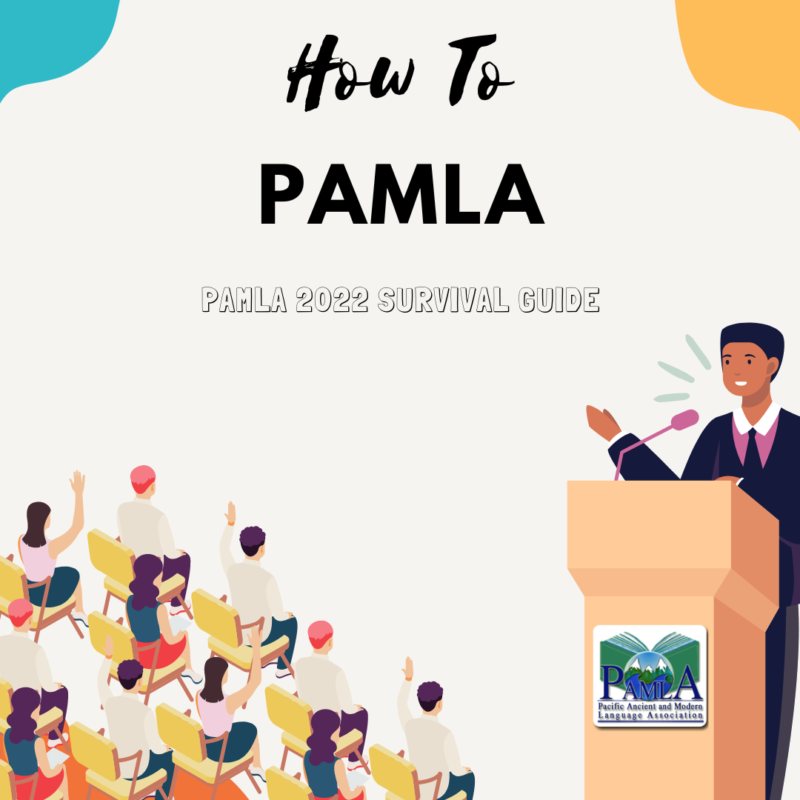
PAMLA 2022 Conference Advice / Survival Guide
Whova Users
- While last year’s PAMLA conference was partially online, this year we are fully in-person! However, we will be offering our Whova app of the conference schedule for all of our participants. If you’d like to use our Whova application to organize your conference experience, you will need to create a Whova account to access our virtual events and sessions, and download the Whova app. Users of Whova, please use your email that you use for PAMLA to sign in. And please do so very soon, as a lot of fun, interesting, and exciting conference discussion is already taking place on Whova.
COVID Policy
- Remember to follow our COVID-19 policies that we have written here. You will need to be fully vaccinated, and we encourage everyone to get the new bivalent vaccine. If you have any questions about vaccination or COVID policy, do contact PAMLA Executive Director, Craig Svonkin: [email protected] or 626-354-7526.
Q&As
- Go to other folks’ sessions, and during the Q&A at the end, ask a real, thoughtful question or two (please don’t make a speech disguised as a question). Doing so will be good for you, and good for the presenter and the entire session. Good listeners and thoughtful, polite questioners make a conference more successful.
Session Attendance
- Go to as many other sessions as you can. Don’t just give your paper and leave. The karma you generate as a result of attending other sessions will mean more people will attend your session in turn. If everyone followed this rule, no one would have to complain about the size of their own session’s audience. But remember that the size of an audience isn’t the thing to focus on–what matters is thinking about, writing, and delivering your paper, which hopefully is a step toward revising your conference paper for possible future publication.
- When your fellow presenters are presenting, or when you are in the audience listening to a presentation, do try to pay attention and jot down some notes so you can help to foster a lively discussion following the presentations. A stimulating discussion can be as important and inspiring as three or four interesting papers.
For Presenters or Speakers
- Read through (out loud) and time your presentation a few times before you present, both to make sure you will not go over your allotted time and to be sure your paper reads well and is clear. If you haven’t spoken to your presiding officer yet about how much time you will have, please do email them.
- Remember, “Sing out, Louise!” Be sure those all the way at the back of the room can hear you.If your talk depends on images or text, plan a backup (handouts, or a mime, perhaps?) just in case the AV doesn’t work. Get to your room a few minutes early to check the AV. And factor the AV time into your presentation time. If you have a mere 17 minutes to present, and it takes you three minutes just to get a five minute clip to show, you will only have nine minutes left for your paper (yes, the time you take to set up and get the AV to work does count as part of your allotted time).
- Remember that presenting a paper—or your research, your argument—is a performance. Think about how to perform interestingly your work to an audience. Simply reading as quickly as you can a bunch of words for twenty minutes is probably not the most interesting performance strategy. Your listeners might have just heard five or six other scholarly essays—give them a reason to remain engaged.
- Try to get something real, vital, alive, important, or interesting into your paper. People have limited time and attention, so try to move them, inform them, inspire them, intrigue them, or make them think.
- You are giving an oral presentation, so remember that what might work in a written/read essay may not work in an oral presentation.
- Avoid overly long plot summaries, on the one hand, and overly dense, extended theoretical passages, on the other. Either too much plot summarizing or too much dense theorizing left un-explicated or unapplied can test an audience’s patience.
- You probably should assert something, and you probably need supporting evidence to explain and shore up your main assertion.
- Clarity of prose and clear, logical connections are no crime.
- Try to look up from your paper now and again, so as to make eye contact with your audience. Likewise, try to modulate your voice.
- You don’t need to express every idea you ever had about this subject. Remember, other conferences await you in the future. It is usually more interesting and useful to dive deeply rather than trying to explore too much territory. It is better to speak clearly and thoughtfully rather than to rush too quickly so as to try to cram too much material into a 17-minute presentation.
Organizing and Owning Your Conference Experience
- Stay in contact with your chair and/or presiding officer. They are there to help. Be sure they know you are set for the session, and that you know exactly how much time you have for your presentation. If a problem comes up, please let your presiding officer, chair, and Craig Svonkin, PAMLA Executive Director ([email protected] or 626-354-7526), know immediately.
- Look at the Map of the Luskin Conference Center, and the Conference Schedule for the conference, ahead of time. Be sure you know where you need to be, and where you want to be. Leave for your session early enough so that even if something were to go wrong, you’d still arrive in time for your session. Arrive early to pick up your registration materials (the registration process may take, depending on crowds, 15-30 minutes), and arrive at your session early as well. Plan sufficient time for all of that. Nothing horrifies a panelist more than the chair arriving late, and nothing horrifies a chair more than a panelist arriving late. Or better yet, look at your Whova web platform for the schedule, or the Whova mobile app.
- Try to be friendly and have fun. If this is your first PAMLA conference, welcome. If you are naturally shy, do try to push yourself to be friendly. Put yourself out there—if you do push yourself a bit, you will have a better and more productive time.
- Don’t take yourself too seriously. You might make mistakes. That’s fine. Just keep moving forward, with a good sense of humor and a desire to learn.
- Come to the special conference events and sessions (for example, the PAMLA Welcome Event; PAMLA Keynote; our two PAMLA Receptions; the PAMLA Forum; the Presidential Address and Plenary Address.
And there are many other terrific sessions for you to choose from. As long as we have good topics proposed, we will have fascinating papers and discussions for you to join. So, please check out our conference schedule here or on Whova!
